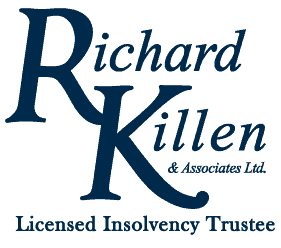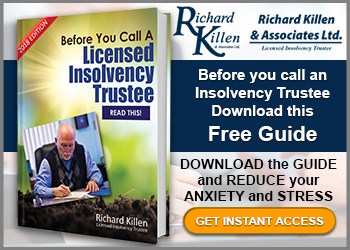CRA Debt Forgiveness – CRA Requirement to Pay & Collections
If the CRA collections department has contacted you with an official CRA request to pay and you have no money to pay, there may be an opportunity for CRA Debt Forgiveness if you qualify as insolvent.
Owing significant income unpaid tax debt to the Canada Revenue Agency (CRA) can be very stressful. However, you are not alone. It is the largest type of debt that most Canadians have. In fact, many people you meet every day have some form of tax debt. It’s a very common situation, especially with small business owners and individuals to owe tax debt on personal income, GST/HST returns, benefit overpayments, defaulted Canada student loans, EI overpayments and penalties, and CPP overpayments. Those who have cashed out their RRSPs may owe taxes, also those with no regular wages and have unreported employment that evades withholding tax, and retirees who receive a monthly pension and are not paying enough tax during the year.
If you have tax obligations that are too large to manage, you may be looking for a way to reduce or eliminate this. You do have several options for repaying unpaid taxes, and consulting with a Licensed Insolvency Trustee can greatly help you. At Richard Killen & Associates we can give you all of your options and provide professional advice on the best way to deal with your tax problem.
CRA GARNISHMENT LIMITS & CRA WAGE GARNISHMENT
Dealing with overdue income tax debt in Canada is not a situation you want to be in. The CRA is a very powerful creditor and it can exercise very strong collection powers and exercise legal action against you without having to go through the federal court.
Some common powers of CRA collections include the following:
- The agency can issue a CRA Requirement to Pay (RTP) put a freeze on your bank account and seize the funds on deposit. The bank will be required to forward your money directly to the CRA.
- It can also issue a CRA wage garnishment and garnish all your sources of income. CRA can garnish up to 50% of your employment income, and if you are self-employed it can garnish up to 100% of your client invoices.
- CRA garnishment limits can even include child tax credits, Canada Pension Plan or Old Age Security benefits, Employment Insurance benefits, Ontario Trillium Benefit payments, GST credits, tax refunds, and other government programs, and apply these funds toward your outstanding debt.
- The CRA can seize and sell your assets to ensure payment of the debt owing, and they’ll even make you pay the costs and charges incurred for selling your property.
If you get a notice of assessment detailing the amount of income tax you owe and see that you owe a lot of money to CRA, the best step is to pay what you owe in full. It’s not an issue that’s just going to go away, so choosing not to do anything cannot be an option. You have to take tax debts seriously, or else the government will exercise its collection powers to the fullest extent to get the money that it is owed. They’ll freeze your bank account, garnishee your wages, and put a lien on your house. The only way the CRA will leave you alone is if you pay up.
If you are in financial hardship and can’t afford to pay in full now, the best thing to do will be to contact CRA. You can either contact the CRA directly or you can choose to retain representation to communicate with them on your behalf. Communication is essential at this point. The CRA simply wants to know why you cannot pay, and reaching out to them will show that you have every intention to cooperate and settle the issue.
If you choose not to do anything, interest, and penalties will continue to accumulate on your existing balance as each day passes. In addition, a CRA requirement to pay may be issued against you which could result in significant financial or legal consequences for you. Whether you pay the amount you owe in full or make other arrangements, you must respond to CRA collections either way so they won’t take any further action.
If you require representation to communicate with them, reach out to us at Richard Killen & Associates and we can help you obtain tax relief and resolve your tax problems. The CRA can be difficult to negotiate with, and our team can offer legal knowledge, skill, and experience on various taxpayer relief provisions to solve your tax problem and put an end to CRA debt collection activities against you.
CRA PAYMENT ARRANGEMENTS
If you can’t afford to pay your tax debts in full, you may be thinking, “How do I pay the CRA amount owing?”
The good news is you have several options available for tax relief if you cannot pay the CRA in full immediately. Depending on which program you choose, you may be able to make a deal to reduce payment on back taxes if you can’t afford to pay the full total amount at once and you may also obtain some form of CRA debt forgiveness for taxes you owe.
Let’s look at some of your options to pay off your taxes which have become overdue:
Payment Arrangements
You can try and negotiate tax debt with the CRA and make a payment arrangement that would allow you to make smaller payments over time.
Points to consider about extended payment arrangements:
- You will have to repay 100% of your tax debt.
- Penalties and interest charges will continue until your debt is paid in full.
- If you cannot reach a payment agreement with the CRA, they can withhold child tax credits and GST credits, garnish your wages, and take funds from your bank account until your debt is paid.
If you can pay off the debt over the next six to twelve months and arrange to send post-dated cheques or set up payments directly from your bank account, the CRA is likely to accept this type of arrangement.
Taxpayer Relief Provisions
If you cannot afford to pay the full amount, you can negotiate with the CRA to waive penalties and interest charges under the CRA Taxpayer Relief program.
You may qualify for tax relief of penalties and interest if you can provide concrete evidence that an extraordinary circumstance has led to your tax problem.
Extraordinary circumstances can include:
- A natural disaster
- A death
- Medical/health problems
- Financial hardship
- An error on the part of the CRA
It is important to understand that the taxpayer relief program will only provide forgiveness of penalties and interest charges by cancelling all or only a portion of the interest and penalties, it will not reduce the principal amount of the tax debt.
CRA Consumer Proposal & CRA Debt Forgiveness
One effective option available to tax debtors to settle taxes owed and obtain CRA debt forgiveness for CRA is to make a consumer proposal to the Canada Revenue Agency. It’s the only tax relief program they accept in most circumstances. Generally, the CRA does not allow individual taxpayers to pay less than the full amount owed. However, they almost always agree to a consumer proposal, particularly in cases where they are the majority creditor and they determine that it is the best offer you can give them after a careful review of your income, expenses, assets, and other personal and financial information.
Some benefits of filing a consumer proposal for income tax debt relief in Canada:
- It’s possible to reduce the amount of your tax debt both on the principal amount and interest charges so you only pay a portion of the full amount you owe. The reduction will depend on your current financial circumstances – your income, expenses, and assets you own.
- An immediate benefit is that a “stay of proceedings” is put into place after filing which stops all collection actions taken by the CRA collections agent. This means that once your trustee files the consumer proposal and notifies your creditors, which includes the CRA, the agency is legally required to stop garnisheeing wages, they cannot freeze your bank accounts, and they can no longer seize your assets or register a lien against your house.
- You can include your other unsecured debts – not just tax debt – such as credit card debt, overdraft or line of credit, payday loans, certain student loans, other government debts, and personal loans.
A consumer proposal can be filed with a Licensed Insolvency Trustee, who will make an offer to the Canada Revenue Agency and negotiate for a deal to repay what you can afford.
Personal Bankruptcy and Tax Debt
Despite your best efforts, there may be no realistic way that you can repay your tax debt in full, even on a payment arrangement or a tax relief. It may be that the amount of the debt is exceedingly enormous expense simply cannot allow for a monthly payment on your budget. In this case, a personal bankruptcy may be considered as a debt solution of last resort.
Tax debts are unsecured debts, just like credit card debt and lines of credit, and can be discharged through bankruptcy.
As with a consumer proposal, bankruptcy can only be filed with a Licensed Insolvency Trustee (LIT).
A bankruptcy can legally protect you from your creditors in the same way a consumer proposal would as it provides the same creditor protection from the CRA through the stay of proceedings.
However, it is important to know that if your tax debt is greater than $200,000 and is more than 75% of your total unsecured debts, you will not get an automatic discharge.
There are other additional requirements for filing bankruptcy for tax debts that can create complications. A Licensed Insolvency Trustee can provide expert advice on how to best deal with these complex tax debt situations.
HELP WITH CRA DEBT
At Richard Killen & Associates we have helped thousands of taxpayers deal with a broad range of tax debt situations for more than 25 years. Our Licensed Insolvency Trustees have the experience to negotiate with the CRA and can help you arrange affordable terms to give you a fresh start and become free from the burden of tax debt.
We offer a complete solution to your tax problems:
- Negotiate tax debt so you pay only what you can afford
- Tax relief helps to eliminate tax penalties and interest
- Tax garnishment helps to protect your finances and sources of income
- CRA consumer proposal or bankruptcy
Call 1-888-545-5365 to book a free consultation with a Licensed Insolvency Trustee at Richard Killen & Associates. We will provide a free assessment of your financial situation and determine which tax debt relief in Canada is best for your circumstances.
Call our office if you were contacted by the CRA collections with a CRA request to pay letter, as under certain circumstances you may be entitled to the CRA debt forgiveness.











